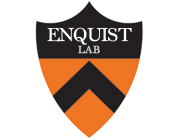Alpha-herpesvirus infection induces the formation of nuclear actin filaments.
Type
Herpesviruses are large double-stranded DNA viruses that replicate in the nuclei of infected cells. Spatial control of viral replication and assembly in the host nucleus is achieved by the establishment of nuclear compartments that serve to concentrate viral and host factors. How these compartments are established and maintained remains poorly understood. Pseudorabies virus (PRV) is an alpha-herpesvirus often used to study herpesvirus invasion and spread in the nervous system. Here, we report that PRV and herpes simplex virus type 1 infection of neurons results in formation of actin filaments in the nucleus. Filamentous actin is not found in the nucleus of uninfected cells. Nuclear actin filaments appear physically associated with the viral capsids, as shown by serial block-face scanning electron micropscopy and confocal microscopy. Using a green fluorescent protein-tagged viral capsid protein (VP26), we show that nuclear actin filaments form prior to capsid assembly and are required for the efficient formation of viral capsid assembly sites. We find that actin polymerization dynamics (e.g., treadmilling) are not necessary for the formation of these sites. Green fluorescent protein-VP26 foci co-localize with the actin motor myosin V, suggesting that viral capsids travel along nuclear actin filaments using myosin-based directed transport. Viral transcription, but not viral DNA replication, is required for actin filament formation. The finding that infection, by either PRV or herpes simplex virus type 1, results in formation of nuclear actin filaments in neurons, and that PRV infection of an epithelial cell line results in a similar phenotype is evidence that F-actin plays a conserved role in herpesvirus assembly. Our results suggest a mechanism by which assembly domains are organized within infected cells and provide insight into how the viral infectious cycle and host actin cytoskeleton are integrated to promote the infection process.

